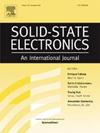Degradation analysis of GaN-based high–electron-mobility transistors under different stresses in semi-on state conditions
Abstract
The large numbers of high-energy carriers that occur in semiconductor devices under semi-on state conditions can cause significant device degradation. The effects of different stresses on the electrical and trapping characteristics of GaN-based high-electron-mobility transistors (HEMTs) are investigated. Test results for GaN HEMTs under semi-on state conditions show that the electrical characteristics of these devices degrade to a certain extent after they are subjected to electrical pulse stress cycles with different drain voltage, frequencies, and duty cycles; a degree of degradation also occurs in the electrical characteristics of the devices when they are subjected to direct current electrical stresses. After electrical stress is applied, the absolute amplitude of the traps in the device increases, thus indicating an increase in the trap density. The results show that voltage is the main driver for device damage, with the current playing an accelerating role through its effects on device temperature or by supplying hot electrons; therefore, the drain voltage has the most significant effect on device degradation, which is mainly due to channel high-energy hot electron injection.

 求助内容:
求助内容: 应助结果提醒方式:
应助结果提醒方式:


